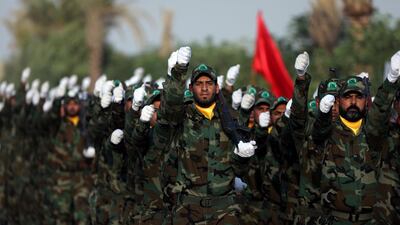Even as bubbling tensions between Israel and the Iranian proxy Hezbollah have cooled off on one front, new battle lines between the two regional powers are being drawn in Iraq.
After a series of recent strikes on Popular Mobilisation Forces fighters, weapons depots and military bases by Israel, the Iran-backed militia has announced its intention to launch its own airforce. In arming itself in this way, the militia, made up of about 40 different factions, is threatening to become a force in its own right, with little control or accountability to the Iraqi state. This is a dangerous proposition that can only have dire consequences for the country as well as the wider region.
The PMF, also known as Hashed Al Shaabi, emerged in 2014 as part of the offensive battling the rise of ISIS after the fall of Mosul. However, several of the groupings under its umbrella pre-date ISIS, and have worked to undermine the Iraqi state.
The PMF paramilitaries fought alongside Iraqi security services and helped defeat the terrorist group. However, even though it has officially been under the command of the Iraqi government and its security forces for the past three years, some groups within the PMF still maintain direct ties with Tehran.
While Israel has not officially claimed responsibility for the strikes, its prime minister Benjamin Netanyahu has threatened to seek out Iran-linked bases in Iraq, Syria and Lebanon and vowed to “do anything necessary to thwart Iran’s plans”. This is deeply concerning for the sovereignty of those countries, which already suffer from weak governance.
Meanwhile Tehran's militant influence has been infiltrating the porous 1,500-kilometre border with Iraq in multiple ways. Iraqi Prime Minister Adel Abdul Mahdi has struggled to maintain control over the PMF, weakening his own position. Should the militia gain the ability to conduct aerial warfare, it will only enable the PMF to compete with and overshadow the government on an even bigger scale.
Last week’s visit to Russia by Iraqi politician and PMF chairman Falih Alfayyadh – reportedly in co-ordination with Mr Abdul Mahdi, who was in Moscow to discuss the possibility of acquiring air defence systems – demonstrates the significant role these militias play in national politics and, by extension, the influence of the Iranian regime. In fact, recent overtures by Iraq’s government to do business with Russia could be construed as reflective of a waning allegiance to the US, which has targeted four PMF leaders with sanctions.
The potential to strengthen itself with an airforce will give the PMF considerable military power, eclipsing even the armoury of Hezbollah and rendering it an Iraqi outpost of Iran's Islamic Revolutionary Guard Corps. Equally concerning are the threats made by Kataib Hezbollah, one of the more extreme factions making up the PMF, to strike American bases in Iraq if its warehouses continue to be targeted. The group warned it would react with a "decisive and harsh response".
Iraq is at risk of being turned into an active battleground once again as different powers wrestle for supremacy on its turf. This comes just three months after Baghdad's heavily fortified Green Zone, which had been off limits to the public since the 2003 war, was dismantled and reopened to the public, a moment Iraqis had awaited for 16 years. Amid such initiatives to secure and sustain peace in Iraq, the recent escalation of tensions between the PMF on one side, and the US and its allies on the other, has the potential to erase whatever progress been made since the end of the war.

